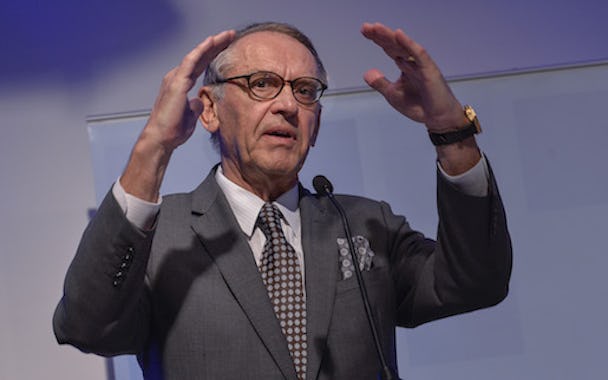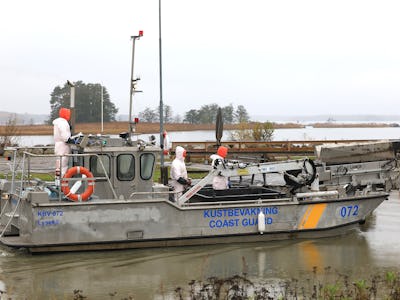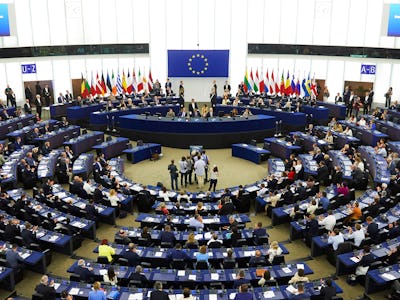Jan Eliasson: We’re on the brink now

Jan Eliasson.
The US reversal in climate politics worries Jan Eliasson who recently left his position as Deputy Secretary-General to the UN.
”It is serious that one of the most important global actors is sending the message that we are going to ignore our next generations”, says Jan Eliasson.
These words come the day before news agency Axios reported the the US may pull out of the Paris Agreement on climate change, which at the time this article is published is still not confirmed.
Arbetet Global meets Jan Eliasson for an interview in Stockholm where he is participating in a preparatory seminar for the UN organized The Ocean Conference.
Jan Eliasson points out that through personnel appointments, the US president Donald Trump already has clearly indicated his wish to form a policy on climate different from that of the Obama administration. Bringing back coal as a strategically important source of energy is further evidence of that.
But despite the reversal, Jan Eliasson can see rays of light. He feels it will be difficult for the new US president to reverse ongoing progress.
“When I met many top politicians and business leaders in the US last autumn, they claimed that progress is already irreversible”.
They pointed out that even if the US leaves the Paris Agreement, an adaptation to the Obama climate policies was already underway, including the environmental regulations that have already become laws in several US states.
“And those laws do not disappear. Add to that, investments in renewable energy sources in the US have led to employment that outnumbers coal workers by four or five to one”.
Jan Eliasson speaks of the importance of getting individual countries to realize their own gains from international agreements, claiming “It’s either ‘win, win’ or it’s ‘lose, lose’ for all countries”.
The former Deputy Secretary-General repeats the message several times that national leaders who want what is best for their country must make agreements with other countries. His point is that closing borders is costly for everyone.
There is of course one problem with that line of argument. The best interests of a country need not necessarily be the best interest for that country’s political leadership.
Donald Trump in the US, Vladimir Putin in Russia and Tayyip Erdogan in Turkey are examples of leaders that base their personal political power around the rhetoric of external threats and a need to turn inwards against the outside world.
Further indication of this development is Great Britain eventual exit from the EU and the nationalist solutions that are being preached by parties that are gaining popularity in the Netherlands and France among others.
“Yes, I know. We are on the brink. Which forces will prevail? Will it be those who look inwards and see the outside world as a threat, or will it be those of us who say that we are dependent on each other?”
But Jan Eliasson stresses that there are different developments too.
“Interestingly, China has shown an increasing willingness to stand up for multilateralism and to fight against protectionism. They also want to support the UN to a very different extent than before. And this is happening at a time when there is a risk that the US will cut its contribution to the UN by between 20 to 30 percent, which will cost our ability to act forcefully.”
The fact that Sweden and other small countries are aware of their dependence on international agreements is not odd, but Jan Eliasson is convinced that large nations will also recognize the importance of them.
“The large countries have to realize that no national options can deal with global problems, which eventually become local anyway. You cannot find a national solution for climate change, or for ocean sustainability, or migration and refugee issues. These complex issues are both national and international.”
“It’s just a matter of time before the realization of the need for international agreements hits home. It is though tragic that it takes so long to break down the fallacy that you can build welfare, peace and the future only by advancing your own interests.”
Over the past few weeks, the division between the US and Europe has grown deeper. The different attitudes to climate change is one example.
Relations got even cooler when Donald Trump used the occasion of the opening of the new NATO headquarters in Brussels, to lecture the EU leadership on the need to increase military spending. This was followed by the Chancellor of Germany Angela Merkel declaring that the time had come for Europe to take their destiny into their own hands.
”This underlines that the direction that the US has chosen to follow is not the same as the one that the Western democracy wish to move in”
“If this means a division between the US and Europe, that is a grave situation. Yet if it is due to such a principally important and vital issue for human kind as the global climate, than it is understandable that a stand needs to be taken. We have to mobilize the positive forces.”
It is in the middle of this turbulent phase that Sweden has joined the UN Security Council.
There are many challenges. Jan Eliasson was state secretary for Foreign Affairs the last time Sweden was on the Security Council, from 1997 to 1998.
He sees major differences between how things were then and how they are now.
“It’s a tougher job today than we had then. Conflicts have become more complicated”
Today the phenomenon of proxy wars has become more common, that is wars that actually represent the interests of two foreign countries, but where combat occurs in the third country. Syria is an example of this type of conflict.
The most important issue that the Security Council has to contend with at the moment is to bring the war in Syria to an end.
Jan Eliasson admits, “After so many years, I feel it is a huge failure. I feel very frustrated by the fact that the council on the 30th of June 2012 missed an opportunity to do something about the conflict”.
Eliasson refers to the plan of the previous Secretary-General Kofi Annan that sought to stop the war in Syria by appointing a provisional government.
“That plan should have been sanctioned by the Security Council as a binding resolution in the summer of 2012. That fact that this didn’t happen is a deep tragedy of history.”
The upcoming UN Ocean Conference, which will be held in New York from July 5 to 9, is co-hosted by Sweden and Fiji.
The agenda is to have global discussions on what must be done in order to push through the UN Sustainable Development Goal 14 that deals with the oceans, seas and marine resources.
As a warm-up to the conference , Eliasson joined Deputy Prime Minister of Sweden and Minister for International Development Cooperation and Climate Isabella Löven at a seminar in Stockholm reviewing the present state of the oceans of the world.
Polar ice is melting, animal species are going extinct and the seas are filling with plastic that take 300 to 400 years for nature to break down.
Deputy Prime Minister of Sweden Isabella Lövin, of the Swedish Green Party, and Jan Eliasson discussed the coming challenges to marine life. Photo: Erik Larsson
To many people, the climate catastrophe is inevitable.
Jan Eliasson does not agree.
“The worst position to take is to lose hope”. Instead Jan Eliasson calls for more ‘hope’ factors, that can instill a belief that a turnaround can happen.
“To me, these factors are technology, the young generation and women. I believe that the liberation of women will have an enormous impact on politics, economies and social conditions all over the world”.








